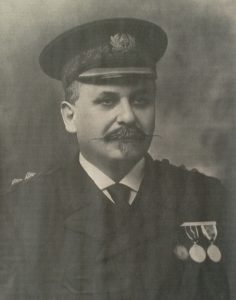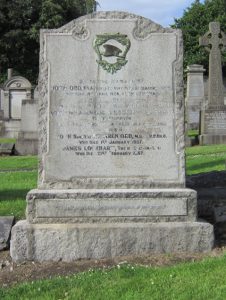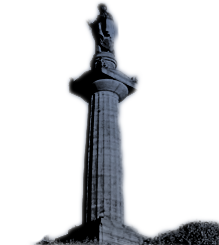SUPERINTENDENT JOHN ORD 1862-1928

The family met with Alistair Dinsmor, Curator at the Glasgow Police Museum, met with the Secretary of the Old Glasgow Club at Trades House where they found copies of lectures that Superintendent John Ord had given there on a variety of topics.
Medals he is wearing :
King Edward VII Visit to Scotland Medal 1905
Kind George V Coronation Medal 1911
King’s Police Medal for Gallantry (awarded 1914)
Secundus Lair 62/64
The Memorial Stone has just been restored by family members.
JOHN ORD was a Collector of Scottish Music and at some time lived overlooking Glasgow Green. There is evidence that his contemporary and fellow Collector, Robert Ford, did communicate with John Ord. One letter, from Ford to Ord, is preserved in the Mitchell Library, Glasgow. It is a short note re a ballad query:
‘Glasgow 27th January 1902
My Dear Sir, Thanks for your letter of 22nd Inst, as also for copy of ballad ‘The Boy of Gight’, though the piece, I may tell you, is not new to me. It is included in Buchan’s Ballads of the North Countrie, whilst a less elaborated version is contained in most collections under the title of ‘Geordie’. All the same, I am obliged to you, as I have been before now, and have pleasure in presenting you with a copy of the second series of my Vagabond Ballads…’
John Ord, although well known as a Collector, was much better known in another important capacity. He was a member of the Police Force, rising to the position of Superintendent of the Southern Division in the Glasgow Police Force. Ord achieved considerable fame in this position not only for his founding of the notorious Black Museum at Turnbull Street and for his presentation of the white glove to the High Court on one occasion – a ceremony to indicate that no cases were to be tried, but for his involvement with several of the important criminal cases of the day. Of these, the most sensational was undoubtedly the case of Oscar Slater. John Ord was in charge of the investigation, and it now seems that he must bear some (but certainly not all) of the blame for the bungling of the case. Slater was clearly a scapegoat and the Glasgow Police Force were under substantial public pressure to solve the crime. It is evident that the case against him should never have been brought to court.
Whatever, the rights of this case, however, it does raise an interesting aspect of Ord’s interests. It has been suggested that Ord’s involvement in the case was influenced in some way by a masonic connection. Ord was certainly interested in secret societies. A remarkable article that he published in the Glasgow Weekly Herald of 13th November 1920 entitled ‘The Most Secret of Secret Societies: Ancient Scottish Horsemen’, reveals that he claims to have been a member of the society of the Horsemen’s Word – a secret brotherhood of ploughmen prevalent in the north-east of Scotland. This may shed some light on the origin of the songs in his major written work, The Bothy Songs and Ballads of Aberdeen, Banff & Moray Angus and the Mearns, published posthumously, shortly after his death, in 1930.
Bothy Songs and Ballads is an authentic collection of folksongs from the north-east, similar to those published by Greig in Folk Songs of the North-East (a limited edition published by the Buchan Observer), a few years before. So, the indication is that Ord obtained at least some of his songs from primary sources, unlike Ford.
More than twenty years elapsed between the publication of Vagabond Songs and Bothy Songs and Ballads and the latter is, in most respects, a more ‘modern’ collection, based on the authentic tradition encouraged by Motherwell rather than the more ‘literary’ tradition favoured by Ford. Ord’s original comments on Motherwell and others, however, indicate that he had formulated his approach some forty odd years early.
In terms of collecting, the original edition of Bothy Songs and Ballads still comes up occasionally at a relatively high price but there is a more widely available reprint published by John Donald Publishers.
Similarly, the first edition of Vagabond Songs, published in two volumes between 1899 and 1901 is scarce (and was so, apparently, shortly after it’s publication) but the revised second edition in one volume, dated 1904, often appears in secondhand bookshops. Ford’s other works were generally published in comparatively large print runs.

Secundus Lair 62/64
The Memorial Stone has just been restored by family members.
Bothy Songs and Ballads is Ord’s only major work, although he published extracted articles on a variety of subjects including ‘The Story of the Barony of Gorbals’ ‘the Story of the Burgh of Calton’ http://www. glasgowhistory.co.uk/ OrdsCalton.htm and ‘The Origin and History of the Glasgow Police Force’. He was also an enthusiastic member of the Old Glasgow Club (his daughter was later to write its history) and contributed to its proceedings. An article which is also signed by Ord was entitled ‘Some Glasgow Songs and Song Writers’.
The above does not by any means constitute a full account of his work and anyone interested will find additional material in the Mitchell Library, Glasgow, who also have in their possession an interesting item – John Ord’s personal scrapbook.
Ian Spring ‘Two Glasgow Folk Song Collectors: Robert Ford and John Ord’, in Hamish Henderson and Scottish Folk Song, Edinburgh: Hog’s Back Press (2014, pp219-230.









